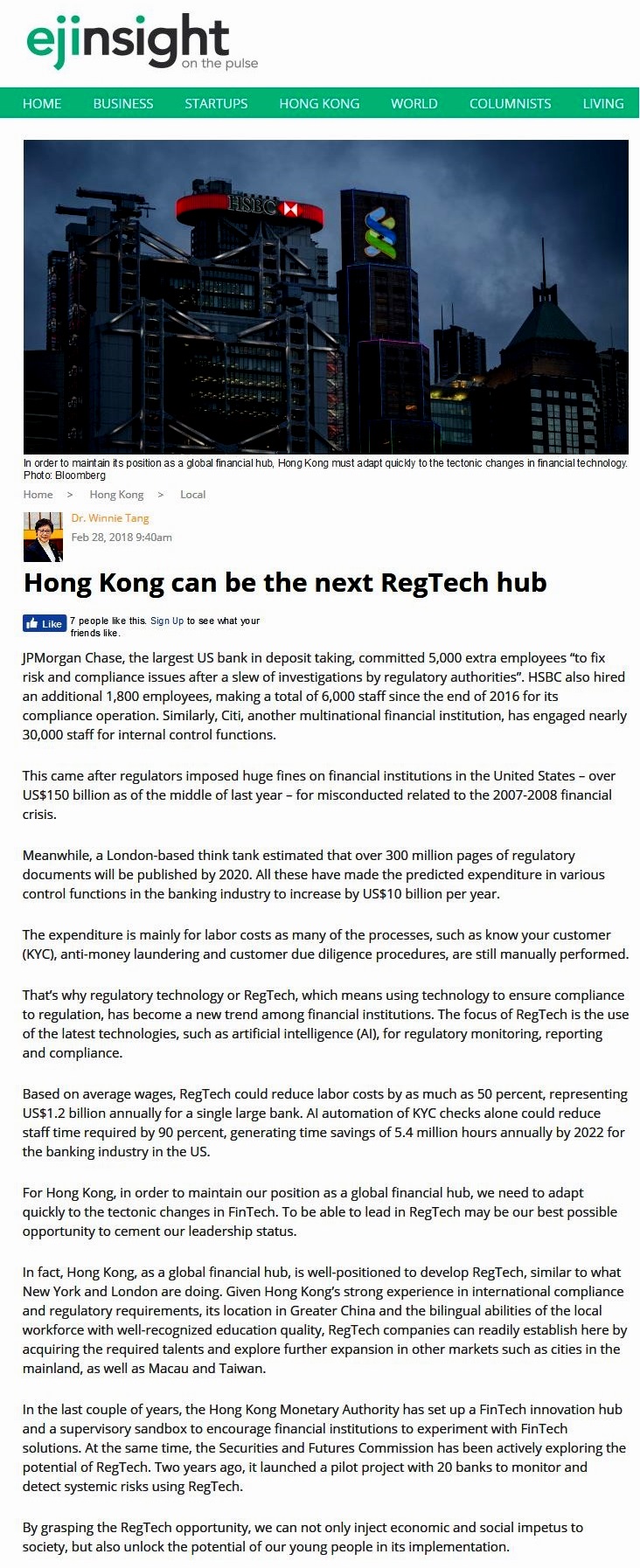網上版請按此

Hong Kong can be the next RegTech hub
JPMorgan Chase, the largest US bank in deposit taking, committed 5,000 extra employees "to fix risk and compliance issues after a slew of investigations by regulatory authorities". HSBC also hired an additional 1,800 employees, making a total of 6,000 staff since the end of 2016 for its compliance operation. Similarly, Citi, another multinational financial institution, has engaged nearly 30,000 staff for internal control functions.
This came after regulators imposed huge fines on financial institutions in the United States – over US$150 billion as of the middle of last year – for misconducted related to the 2007-2008 financial crisis.
Meanwhile, a London-based think tank estimated that over 300 million pages of regulatory documents will be published by 2020. All these have made the predicted expenditure in various control functions in the banking industry to increase by US$10 billion per year.
The expenditure is mainly for labor costs as many of the processes, such as know your customer (KYC), anti-money laundering and customer due diligence procedures, are still manually performed.
That's why regulatory technology or RegTech, which means using technology to ensure compliance to regulation, has become a new trend among financial institutions. The focus of RegTech is the use of the latest technologies, such as artificial intelligence (AI), for regulatory monitoring, reporting and compliance.
Based on average wages, RegTech could reduce labor costs by as much as 50 percent, representing US$1.2 billion annually for a single large bank. AI automation of KYC checks alone could reduce staff time required by 90 percent, generating time savings of 5.4 million hours annually by 2022 for the banking industry in the US.
For Hong Kong, in order to maintain our position as a global financial hub, we need to adapt quickly to the tectonic changes in FinTech. To be able to lead in RegTech may be our best possible opportunity to cement our leadership status.
In fact, Hong Kong, as a global financial hub, is well-positioned to develop RegTech, similar to what New York and London are doing. Given Hong Kong's strong experience in international compliance and regulatory requirements, its location in Greater China and the bilingual abilities of the local workforce with well-recognized education quality, RegTech companies can readily establish here by acquiring the required talents and explore further expansion in other markets such as cities in the mainland, as well as Macau and Taiwan.
In the last couple of years, the Hong Kong Monetary Authority has set up a FinTech innovation hub and a supervisory sandbox to encourage financial institutions to experiment with FinTech solutions. At the same time, the Securities and Futures Commission has been actively exploring the potential of RegTech. Two years ago, it launched a pilot project with 20 banks to monitor and detect systemic risks using RegTech.
By grasping the RegTech opportunity, we can not only inject economic and social impetus to society, but also unlock the potential of our young people in its implementation.
Dr. Winnie Tang
Honorary Professor, Department of Computer Science, The University of Hong Kong